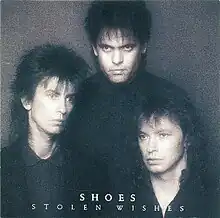| Stolen Wishes | ||||
|---|---|---|---|---|
 | ||||
| Studio album by | ||||
| Released | 1989 | |||
| Studio | Short Order Recorder | |||
| Genre | Power pop | |||
| Label | Black Vinyl Records[1] | |||
| Producer | Shoes | |||
| Shoes chronology | ||||
| ||||
Stolen Wishes is an album by the American power pop band Shoes.[2][3] It was the band's first studio album since 1982 to be released in America.[4] The album, an independent release, sold more than 20,000 copies in its first four months.[5]
Production
The album was recorded at the band's Short Order Recorder studio.[2] Ric Menck, of Velvet Crush, plays drums on Stolen Wishes.[1] Shoes' three principal band members each wrote five songs.[6]
Critical reception
| Review scores | |
|---|---|
| Source | Rating |
| AllMusic | |
| Robert Christgau | B[8] |
| The Encyclopedia of Popular Music | |
| The Rolling Stone Album Guide | |
| Select | 3/5[11] |
The Washington Post wrote that "the music of these studio hermits ... remains as pure and sweet—bittersweet, actually—as such antecedents as the Hollies, the Beau Brummels, and of course the Beatles."[4] Robert Christgau called the band "still hooky after all these years."[8] The Chicago Tribune concluded that "the record celebrates craft rather than quirks, the primacy of melody and harmony rather than dance beats and gimmickry."[6]
The Dallas Morning News determined that the band "continues its tireless pursuit of this thing called love while tossing out some of the most immediately affecting harmonies and melodies since that band from Liverpool."[12] The San Francisco Chronicle opined that "Shoes sounds like classic American heartland rock that won't go away, no matter what."[13] The Austin American-Statesman listed the album as the sixth best of 1990 (and the best independent release), describing it as "boy-girl songs with an older-and-wiser edge in a testament to the timelessness of hooks and harmonies."[14]
AllMusic wrote that Shoes "appeared to have gotten over their collective distrust of keyboards, and the bright, punchy sound, peppy tempos, and frequent synthesizer washes of Stolen Wishes sound like a studied attempt at a more 'contemporary' sound from a band who seemed perfectly content to be slightly anachronistic a decade earlier."[7] The Rolling Stone Album Guide determined that "the group's creamy harmonies, propulsive three-chord riffing and yearning choruses cut as deep as ever."[10]
Track listing
| No. | Title | Length |
|---|---|---|
| 1. | "Feel the Way That I Do" | |
| 2. | "I'll Follow You" | |
| 3. | "Love Does" | |
| 4. | "Let It Go" | |
| 5. | "Your Devotion" | |
| 6. | "I Knew You'd Be Mine" | |
| 7. | "Want You Bad" | |
| 8. | "Torn in Two" | |
| 9. | "She's Not the Same" | |
| 10. | "Untangled" | |
| 11. | "I Don't Know Why" | |
| 12. | "Inside of You" | |
| 13. | "I Can't Go Wrong" | |
| 14. | "Love is Like a Bullet" | |
| 15. | "Never Had It Better" |
References
- 1 2 "Shoes". Trouser Press. Archived from the original on 7 October 2021. Retrieved 7 October 2021.
- 1 2 "Shoes Biography, Songs, & Albums". AllMusic. Archived from the original on 2021-10-07. Retrieved 2021-10-07.
- ↑ Caro, Mark (23 Mar 1990). "Shoes' record keeping Shoes' record company busy". Chicago Tribune. Friday. p. U.
- 1 2 "SHOES' POP SOUL 'STOLEN WISHES'". The Washington Post. Retrieved 7 October 2021.
- ↑ Lounges, Tom (November 30, 1990). "Buddy Guy's smoking into Indiana". The Munster Times.
- 1 2 Kot, Greg (1 Feb 1990). "Melodious rock Shoes stick to fundamentals". Chicago Tribune. Tempo. p. 12.
- 1 2 "Stolen Wishes - Shoes | Songs, Reviews, Credits | AllMusic". Archived from the original on 2021-10-07. Retrieved 2021-10-07 – via www.allmusic.com.
- 1 2 "Robert Christgau: CG: shoes". www.robertchristgau.com. Archived from the original on 2021-10-07. Retrieved 2021-10-07.
- ↑ Larkin, Colin (2006). The Encyclopedia of Popular Music. Vol. 7. MUZE. p. 426.
- 1 2 The Rolling Stone Album Guide. Random House. 1992. p. 633.
- ↑ Cavanagh, David (July 1990). "Broken Hearts And Rubber Soles". Select. p. 111.
- ↑ Maurstad, Tom (March 24, 1990). "ARTS DAY". The Dallas Morning News. p. 5C.
- ↑ Selvin, Joel (July 29, 1990). "SHOES: Stolen Wishes". San Francisco Chronicle. Sunday Datebook. p. 44.
- ↑ McLeese, Don (20 Dec 1990). "For critics, the ranking must go on". Austin American-Statesman. Onward. p. 19.